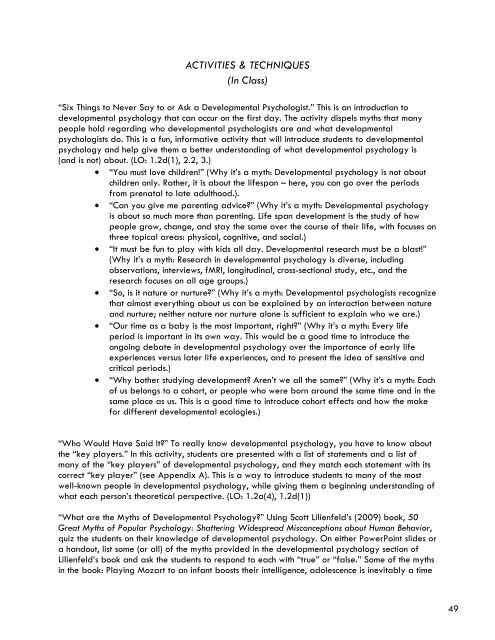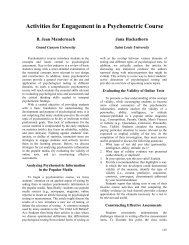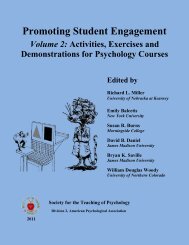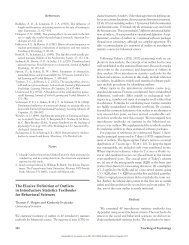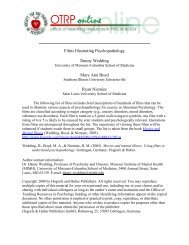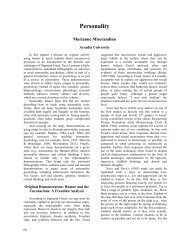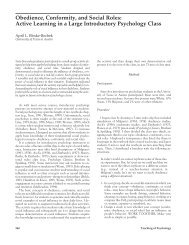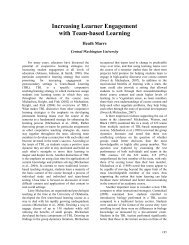INTRODUCTORY PSYCHOLOGY TEACHING PRIMER Early Career ...
INTRODUCTORY PSYCHOLOGY TEACHING PRIMER Early Career ...
INTRODUCTORY PSYCHOLOGY TEACHING PRIMER Early Career ...
You also want an ePaper? Increase the reach of your titles
YUMPU automatically turns print PDFs into web optimized ePapers that Google loves.
ACTIVITIES & TECHNIQUES<br />
(In Class)<br />
“Six Things to Never Say to or Ask a Developmental Psychologist.” This is an introduction to<br />
developmental psychology that can occur on the first day. The activity dispels myths that many<br />
people hold regarding who developmental psychologists are and what developmental<br />
psychologists do. This is a fun, informative activity that will introduce students to developmental<br />
psychology and help give them a better understanding of what developmental psychology is<br />
(and is not) about. (LO: 1.2d(1), 2.2, 3.)<br />
• “You must love children!” (Why it’s a myth: Developmental psychology is not about<br />
children only. Rather, it is about the lifespan – here, you can go over the periods<br />
from prenatal to late adulthood.).<br />
• “Can you give me parenting advice?” (Why it’s a myth: Developmental psychology<br />
is about so much more than parenting. Life span development is the study of how<br />
people grow, change, and stay the same over the course of their life, with focuses on<br />
three topical areas: physical, cognitive, and social.)<br />
• “It must be fun to play with kids all day. Developmental research must be a blast!”<br />
(Why it’s a myth: Research in developmental psychology is diverse, including<br />
observations, interviews, fMRI, longitudinal, cross-sectional study, etc., and the<br />
research focuses on all age groups.)<br />
• “So, is it nature or nurture?” (Why it’s a myth: Developmental psychologists recognize<br />
that almost everything about us can be explained by an interaction between nature<br />
and nurture; neither nature nor nurture alone is sufficient to explain who we are.)<br />
• “Our time as a baby is the most important, right?” (Why it’s a myth: Every life<br />
period is important in its own way. This would be a good time to introduce the<br />
ongoing debate in developmental psychology over the importance of early life<br />
experiences versus later life experiences, and to present the idea of sensitive and<br />
critical periods.)<br />
• “Why bother studying development? Aren’t we all the same?” (Why it’s a myth: Each<br />
of us belongs to a cohort, or people who were born around the same time and in the<br />
same place as us. This is a good time to introduce cohort effects and how the make<br />
for different developmental ecologies.)<br />
“Who Would Have Said It?” To really know developmental psychology, you have to know about<br />
the “key players.” In this activity, students are presented with a list of statements and a list of<br />
many of the “key players” of developmental psychology, and they match each statement with its<br />
correct “key player” (see Appendix A). This is a way to introduce students to many of the most<br />
well-known people in developmental psychology, while giving them a beginning understanding of<br />
what each person’s theoretical perspective. (LO: 1.2a(4), 1.2d(1))<br />
“What are the Myths of Developmental Psychology?” Using Scott Lilienfeld’s (2009) book, 50<br />
Great Myths of Popular Psychology: Shattering Widespread Misconceptions about Human Behavior,<br />
quiz the students on their knowledge of developmental psychology. On either PowerPoint slides or<br />
a handout, list some (or all) of the myths provided in the developmental psychology section of<br />
Lilienfeld’s book and ask the students to respond to each with “true” or “false.” Some of the myths<br />
in the book: Playing Mozart to an infant boosts their intelligence, adolescence is inevitably a time<br />
49


